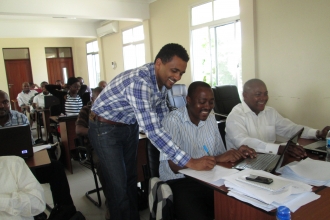Incentives, Impacts, and Behavioral issues in the context of Payment for Ecosystem Services programs: lessons for REDD+
A framework that can be used to assess the potential impact of Payments for Environmental Services (PES) schemes.
A framework that can be used to assess the potential impact of Payments for Environmental Services (PES) schemes.
Many economic decisions are made jointly within households. Running an experiment on intertemporal choice, we investigate the relative influence of spouses on joint household decisions. We let each spouse first decide individually and then jointly with the other spouse.
Deforestation and forest degradation are estimated to account for between 12 percent and 20 percent of annual greenhouse gas emissions. These activities, largely in the developing world, released about 5.8 Gt per year in the 1990s, which was more than all forms of transport combined. The idea behind REDD+ is that payments for sequestering carbon can tip the economic balance away from loss of forests and in the process yield climate benefits.
How does uncertainty about “dangerous” climate change affect the prospects for international cooperation? Climate negotiations usually are depicted as a prisoners’ dilemma game; collectively, countries are better off reducing their emissions, but self-interest impels them to keep on emitting. We provide experimental evidence, grounded in an analytical framework, showing that the fear of crossing a dangerous threshold can turn climate negotiations into a coordination game, making collective action to avoid a dangerous threshold virtually assured.
Hypothetical bias in stated-preference methods appears sometimes to be very large, and other times non-existent. This is here largely explained by a model where people derive utility from a positive self-image associated with morally commendable behavior.

EfD research fellow Dr Elizabeth Robinson from the School of Agriculture, Policy and Development at the University of Reading has been appointed to sit on Defra's Economic Advisory Panel which…
International top scientists and practitioners from EfD, WRI, UNEP, UNDP, IIED, SEI, World Bank and many more met at Sida on September 17 to discuss inclusive green growth, next steps and implications…

The EfD organized and offered the first summer course on “Panel Data Econometrics” at the University of Dar es Salaam, Tanzania and Mekelle University, Ethiopia in July 2012. The courses were taught…
The economics of climate change and the various measures that should be implemented to reduce future damages are highly tied to the use of cost-benefit analysis. Traditional approaches ignore the fact that environmental amenities do not experience the same growth rate as do most of the sectors in the economy, which leads to changing relative prices. Uncertainty should also be considered, especially when one is conducting cost-benefit analysis involving the long-run damages from climate change.
The concept that underlies the interventions of the Global Environment Facility (GEF) International Waters Program is adaptive management at the Large Marine Ecosystem (LME) scale across the sequence of interventions from assessment and analysis to development of regional strategic action programs and national implementation of action plans to address transboundary environmental concerns. The GEF has provided grants to recipient countries in the East Asian Seas region covering five LMEs since the early 1990s and amounting to about US$200 million.